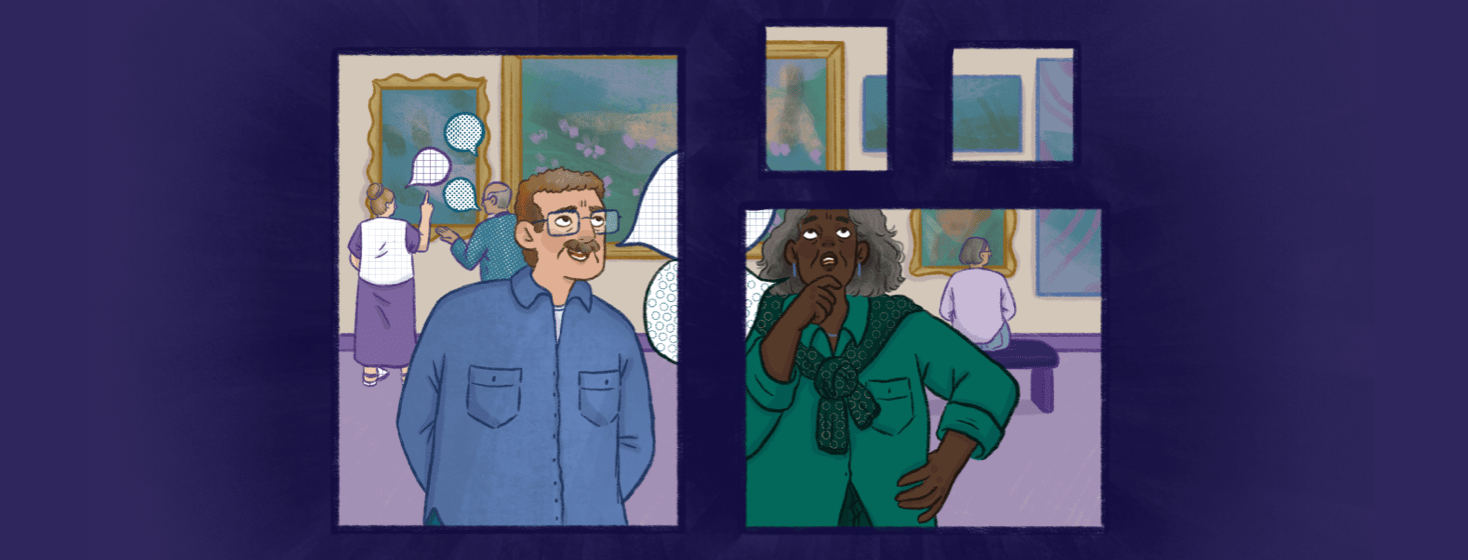Finding Joy in Art: ARTZ Philadelphia
How many times has a beautiful image of a sunset or mountain peak left you speechless? Or you hear the crescendo of an orchestra, and you feel like floating to the ceiling? The arts have a truly magical way of inspiring and calming us. There is a reason we gather together to watch a movie or lend a book to a friend to read.
At ARTZ Philadelphia, Susan Shifrin and her team have created a program that brings together people with Alzheimer's, their caregivers, and the greater community to find a way to get a smile on each person's face.
Find art and find connection
Susan created ARTZ Philadelphia more than 10 years ago as a way for people with Alzheimer's or other dementias and their caregivers to bond over art. "I took a left turn and went in a totally different direction than I had anticipated," says Susan.
In 2010, working at her former museum position, Susan was approached by a social worker about bringing residents of memory care facilities into the museum. "I had spent my career looking for ways to welcome people into museums," she says. Facilitating ways for people to feel comfortable and at home (at any age) was important to her.
"My mom had dementia. I know from the inside what people are talking about," explains Susan.
ARTZ Philadelphia then began in 2013. "I saw our first participants open up, laughing, talking with each other, and even arguing about what the paintings meant," says Susan.
What is the connection between art and dementia?
Susan notes that there has been extensive research done between frontotemporal dementia (FTD) and visual creativity. Something seems to be happening to cause people with FTD to express themselves more visually after they lose their verbal expression. "It seems to be less the art we use and more the power of the group."
The groups at ARTZ Philadelphia are on the smaller side, but Susan's ultimate goal with the program is to foster a sense of community. In this setting, you are not reminded of what you have forgotten. Instead, you are with other people all looking at the same thing at the same time. "You are fully released at the moment," says Susan. And the person feels validated.
"Too many people believe that if you have dementia, you have lost what makes you quintessentially human," Susan says. But that does not need to be the case. If programs guided by people with dementia are developed alongside caregivers, family, and friends, the chance to bring joy into their lives increases tenfold. It really takes the whole community's input.
How can people find joy in art if they aren't close to a museum?
"What brings you joy" is the place where everyone can start, suggests Susan. Simply asking the person what makes them smile can give you a lot of ideas. If it sounds like an easy question to start with, that's because it is.
Find out what is fundamental to that person. Then figure out what part of that activity that person can do. Help the person rediscover something and recognize that it's still there. "If they liked to paint, then finger-paint!" says Susan.
Some things can turn into an "ah-ha" moment for someone with dementia. Finding a beautiful stone or picking up a pinecone can be an opening. It's a chance to spend 5 to 10 minutes touching it, looking at it, smelling it. While it might seem silly, it could start a conversation.
Making time for joy
Susan says the most important thing for someone with dementia and their care partner is to make time for joy. That could be walking together and smelling the flowers or making sure a caregiver grabs coffee with a friend. And don't forget the power of the internet. There are so many programs online. It doesn't matter where anyone is.
"We understand that people's days are not their own. We understand people can't come to the program," says Susan. That means ARTZ Philadelphia, and "the arts" in general, will be waiting for you to come in, smile, and discover your joy.

Join the conversation